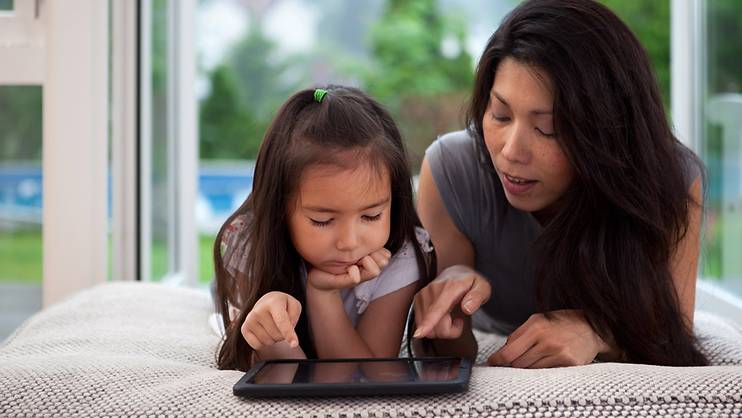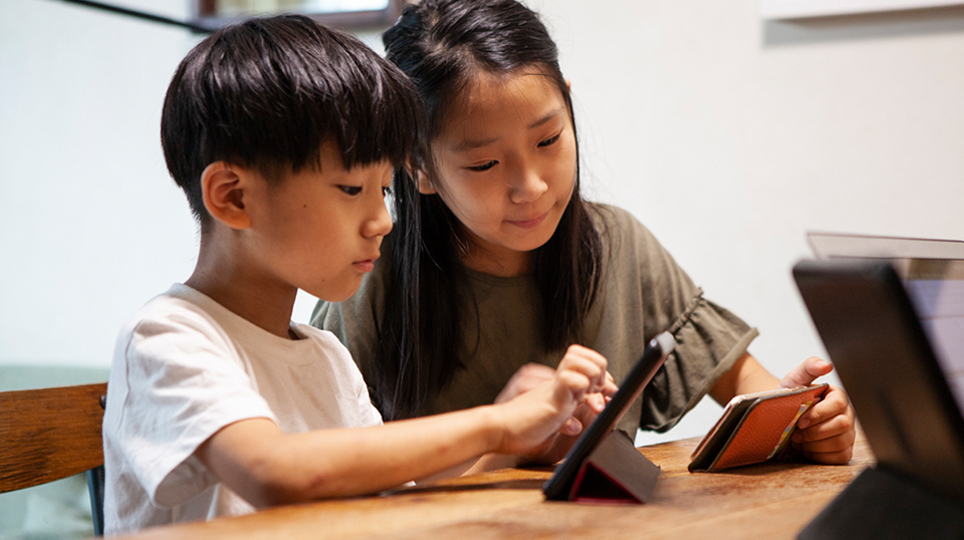Screen time is inevitable for kids of Millennial parents. How much screen time should you allow your young child is probably one of the most contentious debate parents wrestle with today.
There are pros and cons to screen time for children. In one camp, screen time can help children develop problem-solving, social, creative and communication skills. In another camp, parents are concerned that too much screen time for toddlers and preschoolers can lead to health issues and developmental delays.
Is Screen Time for Children Good or Bad?
According to a study published by the Centre for Holistic Initiatives for Learning and Development or Child, set up by the Lien Foundation and National University of Singapore medical school, nine in 10 children under the age of two here are allowed daily screen time without adult supervision and that can lead to problems like language delays and attention deficit. The study found that the higher the amount of screen time between the ages of one and 18 months, the more difficulties were observed in attention, language, and social skills in later childhood.
A recent 2021 study on Singapore children and their screen time habits found that by the age of 18 to 24 months, about 90% of children are engaged in daily passive viewing of screens (i.e. without any parent co-viewing and interaction).
As electronic devices become a common tool for kids growing up, such as playing games or watching shows on phones, tablets, computers, and televisions, parents recognise the need to create a more balanced approach to using tech and leveraging new advances to help in child development.
Parents who feel that screen time is not necessarily a hinder may subscribe to the World Health Organisation’s (WHO) recommendations on screen exposure for kids:
- Toddlers under 18 months are not allowed any unsupervised screen time.
- Pre-schoolers between 18 to 36 months can have limited unsupervised screen time of not more than one hour a day.
- School-aged children and adolescents (6-year-old onwards) are recommended to have no more than 2 hours a day.
Guidelines for Parents on Screen-Time Exposure
To ensure that your child benefit from screen time, parents can adopt the following guidelines:
- Ensure to expose their children to age-appropriate content.
- Limit the screen time and set screen-time rules.
- Co-view the educational and interactive programmes their children and engage them in discussions to enhance the learning and development.
- Create screen-free zones at home and encourage a healthy balance between screen time and outdoor play.
- Develop interests in hobbies such as gardening, flying kites, etc.
- Set aside designated family time to play games, go for outings etc.
Contrary to the nay-sayers, screen time and digital technology use can help your child develop many practical skills like creative, problem-solving, social and digital.
Digital Tools That Help in Your Child’s Learning & Development
Screen time can be utilised as a valuable tool to support your child's learning and development when used in a thoughtful and balanced manner.
Here are some ways you can achieve this:
1. Educational Apps and Games
Choose high-quality educational apps and games that align with your child's age and developmental stage. These can help improve cognitive skills, problem-solving abilities, and even teach new concepts.
2. Interactive Learning Platforms
Many online platforms offer interactive learning experiences through videos, quizzes, and activities. Look for platforms that cover various subjects and adapt to your child's pace.
3. Digital Books and E-books
Access to digital books and e-books can foster a love for reading. Many e-books include interactive features like audio narration or animations that can enhance comprehension.
4. Educational Videos and Documentaries
Screen time can be an opportunity to watch educational videos and documentaries that expose children to new topics, cultures, and ideas, fostering their curiosity and expanding their knowledge.
5. Creative Apps and Tools
There are apps that encourage creativity, such as drawing, music composition, and storytelling apps. These can help children express themselves and develop artistic skills.
6. Language Learning Apps
If your child is learning a new language, there are apps and online resources designed to make language acquisition enjoyable and interactive.
7. Virtual Museum Tours or Field Trips
Explore virtual museum tours or historical sites online, or take virtual field trips to places like zoos, botanical gardens, or historical landmarks. This can be an engaging way to learn about history, art, and culture. These experiences can supplement classroom learning.
8. Coding and Programming
Introduce your child to basic coding and programming through child-friendly apps and platforms. Learning coding concepts can improve logical thinking and problem-solving abilities.
9. Science Experiments and DIY Activities
Use online resources to find simple science experiments or do-it-yourself activities that can be done at home, enhancing your child's understanding of scientific concepts.
10. Educational YouTube Channels & Videos
There are numerous YouTube channels dedicated to educational content for children. These can cover a wide range of topics, from science experiments to historical reenactments. Show your child videos of nature, animals, and wildlife. This can spark an interest in biology and environmental science.
Making Screen Time Beneficial for Learning
Remember, screen time should be just one aspect of a child's overall learning and development. Parent co-viewing or approval is essential to monitor the content your child engages with, and to ensure it is appropriate and aligned with their interests and learning goals. The key is moderation and balance.
Babilou Family Singapore values active learning methods that encourage curiosity and creativity. To learn more about how we help young children be open to learning and explore the world as they learn, check out the learning experiences we offer through our preschool brands and curriculum approaches.
Follow us on social media to stay updated on the latest happenings in Babilou Family Singapore:
Facebook | Instagram | TikTok | LinkedIn


